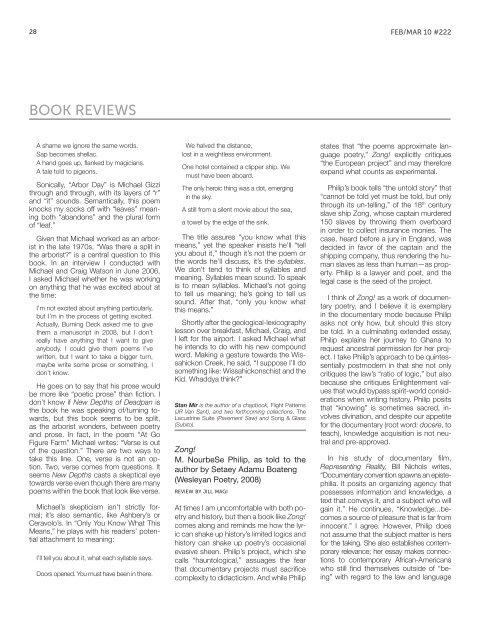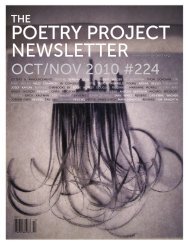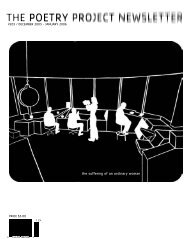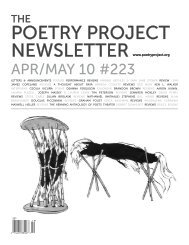Create successful ePaper yourself
Turn your PDF publications into a flip-book with our unique Google optimized e-Paper software.
28 FEB/MAR 10 #222<br />
BOOK REVIEWS<br />
A shame we ignore the same words.<br />
Sap becomes shellac.<br />
A hand goes up, flanked by magicians.<br />
A tale told to pigeons.<br />
Sonically, “Arbor Day” is Michael Gizzi<br />
through and through, with its layers of “r”<br />
and “it” sounds. Semantically, this poem<br />
knocks my socks off with “leaves” meaning<br />
both “abandons” and the plural form<br />
of “leaf.”<br />
Given that Michael worked as an arborist<br />
in the late 1970s, “Was there a split in<br />
the arborist?” is a central question to this<br />
book. In an interview I conducted with<br />
Michael and Craig Watson in June 2006,<br />
I asked Michael whether he was working<br />
on anything that he was excited about at<br />
the time:<br />
I’m not excited about anything particularly,<br />
but I’m in the process of getting excited.<br />
Actually, Burning Deck asked me to give<br />
them a manuscript in 2008, but I don’t<br />
really have anything that I want to give<br />
anybody. I could give them poems I’ve<br />
written, but I want to take a bigger turn,<br />
maybe write some prose or something, I<br />
don’t know.<br />
He goes on to say that his prose would<br />
be more like “poetic prose” than fiction. I<br />
don’t know if New Depths of Deadpan is<br />
the book he was speaking of/turning towards,<br />
but this book seems to be split,<br />
as the arborist wonders, between poetry<br />
and prose. In fact, in the poem “At Go<br />
Figure Farm” Michael writes: “Verse is out<br />
of the question.” <strong>The</strong>re are two ways to<br />
take this line. One, verse is not an option.<br />
Two, verse comes from questions. It<br />
seems New Depths casts a skeptical eye<br />
towards verse even though there are many<br />
poems within the book that look like verse.<br />
Michael’s skepticism isn’t strictly formal;<br />
it’s also semantic, like Ashbery’s or<br />
Ceravolo’s. In “Only You Know What This<br />
Means,” he plays with his readers’ potential<br />
attachment to meaning:<br />
I’ll tell you about it, what each syllable says.<br />
Doors opened. You must have been in there.<br />
We halved the distance,<br />
lost in a weightless environment.<br />
One hotel contained a clipper ship. We<br />
must have been aboard.<br />
<strong>The</strong> only heroic thing was a dot, emerging<br />
in the sky.<br />
A still from a silent movie about the sea,<br />
a towel by the edge of the sink.<br />
<strong>The</strong> title assures “you know what this<br />
means,” yet the speaker insists he’ll “tell<br />
you about it,” though it’s not the poem or<br />
the words he’ll discuss, it’s the syllables.<br />
We don’t tend to think of syllables and<br />
meaning. Syllables mean sound. To speak<br />
is to mean syllables. Michael’s not going<br />
to tell us meaning; he’s going to tell us<br />
sound. After that, “only you know what<br />
this means.”<br />
Shortly after the geological-lexicography<br />
lesson over breakfast, Michael, Craig, and<br />
I left for the airport. I asked Michael what<br />
he intends to do with his new compound<br />
word. Making a gesture towards the Wissahickon<br />
Creek, he said, “I suppose I’ll do<br />
something like: Wissahickonschist and the<br />
Kid. Whaddya think?”<br />
Stan Mir is the author of a chapbook, Flight Patterns<br />
(JR Van Sant), and two forthcoming collections, <strong>The</strong><br />
Lacustrine Suite (Pavement Saw) and Song & Glass<br />
(Subito).<br />
Zong!<br />
M. NourbeSe Philip, as told to the<br />
author by Setaey Adamu Boateng<br />
(Wesleyan <strong>Poetry</strong>, 2008)<br />
review by jill magi<br />
At times I am uncomfortable with both poetry<br />
and history, but then a book like Zong!<br />
comes along and reminds me how the lyric<br />
can shake up history’s limited logics and<br />
history can shake up poetry’s occasional<br />
evasive sheen. Philip’s project, which she<br />
calls “hauntological,” assuages the fear<br />
that documentary projects must sacrifice<br />
complexity to didacticism. And while Philip<br />
states that “the poems approximate language<br />
poetry,” Zong! explicitly critiques<br />
“the European project” and may therefore<br />
expand what counts as experimental.<br />
Philip’s book tells “the untold story” that<br />
“cannot be told yet must be told, but only<br />
through its un-telling,” of the 18 th century<br />
slave ship Zong, whose captain murdered<br />
150 slaves by throwing them overboard<br />
in order to collect insurance monies. <strong>The</strong><br />
case, heard before a jury in England, was<br />
decided in favor of the captain and the<br />
shipping company, thus rendering the human<br />
slaves as less than human—as property.<br />
Philip is a lawyer and poet, and the<br />
legal case is the seed of the project.<br />
I think of Zong! as a work of documentary<br />
poetry, and I believe it is exemplary<br />
in the documentary mode because Philip<br />
asks not only how, but should this story<br />
be told. In a culminating extended essay,<br />
Philip explains her journey to Ghana to<br />
request ancestral permission for her project.<br />
I take Philip’s approach to be quintessentially<br />
postmodern in that she not only<br />
critiques the law’s “ratio of logic,” but also<br />
because she critiques Enlightenment values<br />
that would bypass spirit-world considerations<br />
when writing history. Philip posits<br />
that “knowing” is sometimes sacred, involves<br />
divination, and despite our appetite<br />
for the documentary (root word: docere, to<br />
teach), knowledge acquisition is not neutral<br />
and pre-approved.<br />
In his study of documentary film,<br />
Representing Reality, Bill Nichols writes,<br />
“Documentary convention spawns an epistephilia.<br />
It posits an organizing agency that<br />
possesses information and knowledge, a<br />
text that conveys it, and a subject who will<br />
gain it.” He continues, “Knowledge...becomes<br />
a source of pleasure that is far from<br />
innocent.” I agree. However, Philip does<br />
not assume that the subject matter is hers<br />
for the taking. She also establishes contemporary<br />
relevance; her essay makes connections<br />
to contemporary African-Americans<br />
who still find themselves outside of “being”<br />
with regard to the law and language

















